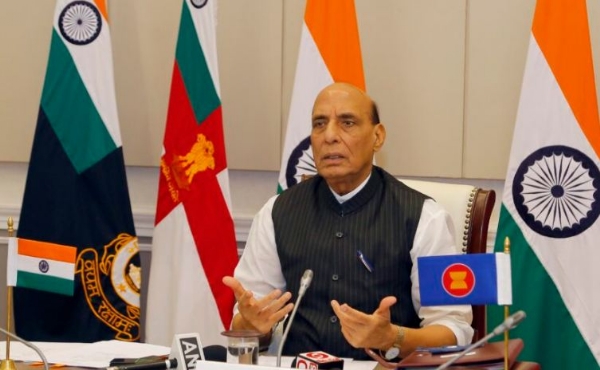
New Delhi: Noting that maritime security challenges is an area of concern, India said it supports freedom of navigation, over flight, and unimpeded commerce in the South China Sea — a statement that comes amid Beijing’s muscle-flexing in the international waterways.
Speaking at the ASEAN Plus Defence Ministers’ Meet, Defence Minister Rajnath Singh also called for a free, open and inclusive order in the Indo-Pacific. Both Chinese Defence Minister Gen Wei Fenghe and US Secretary of Defence Lloyd Austin were part of the virtual meet, a platform for ASEAN and its eight Dialogue Partners — Australia, China, India, Japan, New Zealand, South Korea, Russia and the United States.
Talking about the present regional and international security environment, Singh said new challenges to international peace and security are emerging. “The multitude of challenges of today’s dynamic and interdependent world cannot be addressed with outdated systems that were designed to deal with trials of the past,” he said.
Singh underlined that India calls for a free, open and inclusive order in the Indo-Pacific, based upon respect for sovereignty and territorial integrity of nations, peaceful resolution of disputes through dialogue and adherence to international rules and laws. Noting that maritime security challenges are another area of concern to India, he said the sea lanes of communication are critical for peace, stability, prosperity and development of the Indo-Pacific region.
“In this regard, developments in the South China Sea have attracted attention in the region and beyond. India supports freedom of navigation, over flight, and unimpeded commerce in these international waterways. India hopes that the Code of Conduct negotiations will lead to outcomes that are in keeping with international law, including the UNCLOS and do not prejudice the legitimate rights and interests of nations that are not party to these discussions,” Singh said.
Singh spoke about the common challenge of Covid-19 and said the virus is “mutating fast and testing our response as we find new variants that are more infective and potent”. Noting that India is just emerging from a second wave that pushed its medical response to the limit, he said the disruptive effect of the pandemic is still unfolding.
“The test is therefore to make sure that the world economy moves on the path of recovery and to ensure that the recovery leaves no one behind. I am convinced that this is only possible if the entire humanity is vaccinated. Globally available patent free vaccines, unhindered supply chains and greater global medical capacities are some of the lines of effort that India has suggested for a combined effort,” he said. Singh also flagged terrorism and radicalisation as the gravest threats to peace and security.
“India shares global concerns about terrorism and believes that, in an era when networking amongst terrorists is reaching alarming proportions, only through collective cooperation can the terror organisations and their networks be fully disrupted, the perpetrators identified and held accountable, and strong measures be undertaken against those who encourage, support and finance terrorism and provide sanctuary to terrorists,” he said.
Singh also said cyber threats loom large, as demonstrated by the incidents of ransom ware, WannaCry attacks and crypto currency thefts, and are a cause for concern. “A multi-stakeholder approach, guided by democratic values, with a governance structure that is open and inclusive and a secure, open and stable internet with due respect to sovereignty of countries, would drive the future of cyberspace,” he said.








